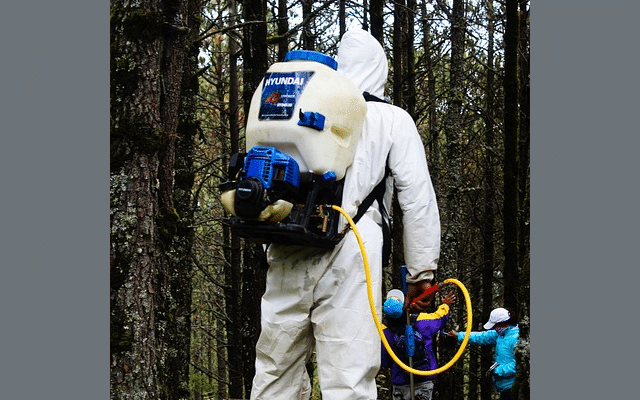The potential link between Roundup, a popular herbicide, and cancer has ignited a contentious debate among scientists, regulatory bodies, and the general public. Glyphosate, the active ingredient in Roundup, has become the focal point of numerous legal battles and lawsuits.
According to the Lawsuit Information Center, despite significant settlements that have addressed around 80% of the pending Roundup claims, there remains a substantial number of active lawsuits, estimated to range from 26,000 to 30,000.
These lawsuits predominantly find themselves in state courts, while an additional cluster of over 4,000 claims is still awaiting resolution within the multidistrict litigation (MDL) Roundup class action lawsuit in California.
These ongoing legal proceedings highlight the importance and intricacy of the Roundup cancer controversy. Individuals seeking legal representation are advised to consult with the best lawyer for Roundup lawsuit to navigate this complex legal landscape effectively.
This article aims to delve into the evidence surrounding Roundup’s potential carcinogenicity and examine the verdicts reached in various court cases.
Understanding Glyphosate and Roundup
Roundup, a widely used herbicide, has been a longstanding fixture in agriculture, landscaping, and home gardening due to its effectiveness in weed control. Developed by Monsanto (now owned by Bayer), Roundup’s key ingredient is glyphosate.
Farmers in the United States alone employ an astonishing amount of glyphosate, with over 200 million pounds being utilized annually on agricultural lands, according to a report from The Guardian.
However, despite its widespread usage, concerns have arisen regarding the safety of glyphosate and its potential link to cancer, adding complexity and controversy to the ongoing discussions surrounding its use.
The World Health Organization’s Assessment
TorHoerman Law notes that in 2015, the International Agency for Research on Cancer (IARC), a specialized agency of the World Health Organization (WHO), categorized glyphosate as likely having carcinogenic properties for humans, based on findings from animal studies. The IARC’s classification triggered widespread public attention and led to an influx of lawsuits against Monsanto/Bayer.
Scientific Studies and Controversies
Numerous studies have been conducted to examine the relationship between glyphosate exposure and cancer in humans. Some studies suggest a potential link between glyphosate and specific cancers, such as non-Hodgkin lymphoma (NHL). However, there is a division within the scientific community regarding this matter.
For example, as reported by Medical News Today, Several scientific studies have identified a correlation between exposure to glyphosate-based herbicides and an elevated risk of specific cancers, such as Non-Hodgkin’s lymphoma (NHL) and its various subtypes.
NHL is a cancer that originates in lymphocytes, a type of white blood cell present in the lymphatic system. It encompasses multiple subtypes, like chronic lymphocytic leukemia, which begins in the bone marrow and can spread to the bloodstream and other body parts.
In a comprehensive meta-analysis conducted in 2019, incorporating six human studies encompassing approximately 65,000 participants, a strong association between glyphosate exposure and heightened NHL risk was observed.
The studies examined the impacts of substantial exposure to glyphosate-based formulations. The researchers arrived at the conclusion that evidence from human, animal, and laboratory-based studies collectively indicates a compelling connection between glyphosate-based herbicides and an increased incidence of NHL.
Notably, individuals exposed to high doses of glyphosate-based herbicides exhibited a 41% rise in NHL cases, as highlighted by the meta-analysis findings.
Conversely, a study published in 2019 in the Journal of the National Cancer Institute analyzed data from the Agricultural Health Study and found no significant association between glyphosate and overall cancer risk.
Verdicts and Legal Proceedings
Since the IARC classification, several high-profile lawsuits have been filed against Monsanto/Bayer by individuals claiming that Roundup exposure caused their cancer.
Notably, in 2018, a jury in California awarded $289 million to a groundskeeper who developed terminal cancer, attributing the disease to Roundup use. Subsequently, the damages were reduced to $78 million on appeal.
Subsequently, a series of similar lawsuits have been initiated, resulting in varying outcomes ranging from significant awards to rulings favoring Monsanto/Bayer. The verdicts have been influenced by factors such as jurisdiction, presented evidence, and interpretations of scientific studies.
Moreover, Bayer has now settled with the state of New York for approximately $7 million due to allegations of false and misleading advertising surrounding Roundup, which claimed the product posed no harm beyond weeds and did not endanger animal wildlife health.
Regulatory Responses and Safety Assessments
Glyphosate and Roundup have undergone safety evaluations by regulatory bodies worldwide. The United States Environmental Protection Agency (EPA) and other agencies have generally determined that glyphosate is unlikely to be carcinogenic to humans when used in accordance with the instructions on the label.
Despite Bayer’s decision to stop selling glyphosate-based herbicides for residential use, the controversy surrounding glyphosate continues. Critics argue that regulatory assessments heavily rely on industry-funded studies and lack transparency in their procedures.
Conclusion
The debate surrounding Roundup’s potential link to cancer continues to generate controversy and legal battles. While some studies suggest a possible association between glyphosate and specific cancers, others have not found significant evidence to support this claim. The verdicts in court cases have been diverse, highlighting the complexity of the issue and the challenges in determining causation.
As more scientific research unfolds and additional lawsuits are filed, it remains essential to closely monitor the evolving evidence and regulatory responses. Ultimately, a thorough understanding of the potential risks associated with glyphosate and Roundup is crucial for individuals, farmers, and policymakers to make informed decisions about their use and safety.
Cover Photo: Pixabay




